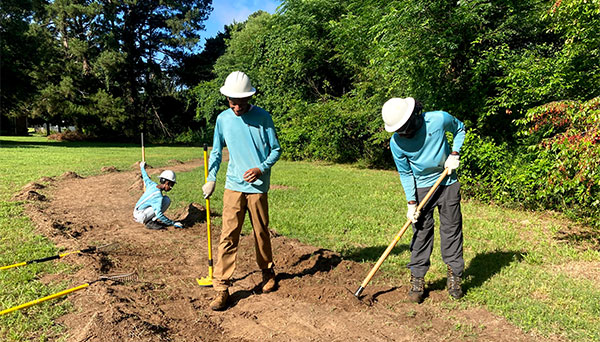Seeding Resilience in Princeville II: Community-driven Adaptation to Climate
Organization: Conservation Trust for North Carolina
The organization seeks through conservation to help build resilient, just communities.
Location: North Carolina, Edgecombe County, Town of Princeville
Country: United States
Other Organizations Involved: Town of Princeville, NC; Edgecombe County, NC; North Carolina State University Coastal Dynamics Design Lab Conservation Corps NC; part of Conservation Legacy; Temboo Software
 © Conservation Trust for North Carolina
© Conservation Trust for North Carolina
Background
This project is part of an ongoing, multi-faceted resilience engagement with and for the Town of Princeville, NC, the nation’s first town chartered by African Americans following emancipation. Princeville has been subject to repeated devastating floods. Project partners build on their history of learning and cooperation with the residents of Princeville to implement a second round of community enhancements aimed at increasing resilience of property and people.
The project incorporates lessons from initial collaborations that established overarching goals for the partnership: follow community-driven decision-making at every stage; move decisively from planning to implementation; build local knowledge and economic opportunity; and develop replicable strategies that address community environmental, economic, and social needs.
Goals
“Seeding Resilience” builds on years of collaboration with town leaders who have co-developed and unanimously approved a plan for how the vulnerable center of town could be made both more flood resilient and cohesive.
Tree plantings along Main Street will absorb excess stormwater, trap carbon emissions, and provide shade for pedestrians. Vacant, town-owned properties will be converted to managed wetlands that create a park-like amenity that captures standing water after flood events. A trail will be installed adjacent to the planned farmers market. Local youth will be employed to build the trail that thematically connects the adjacent Tar River to local produce. Lastly, a community garden will be developed through a community-led volunteer management approach.
Main activities
Specific actions within this project are:
- installation of 6,000 square feet of stormwater BMPs (bioretention cells, rain gardens) on 2 FEMA buyout parcels to hold 27,740 gallons of water per rain event
- creation of 1,750 linear feet of trails with educational and health-benefit elements at Princeville's riverfront Heritage Park
- planting of 50 trees and thousands of native and ecologically adapted ornamental plants for 250,000 gallons of water absorption and 2,900 pounds of carbon storage per year
- launching of a 24-bed model community garden on vacated lots to energize 100 community members around healthier life options and promotion of local low-carbon agriculture
Outcomes
Participating in designing and seeing to fruition this segment of a much larger plan for community resilience will support citizens in their shared vision for a sustainable future that connects social, economic, and environmental components.